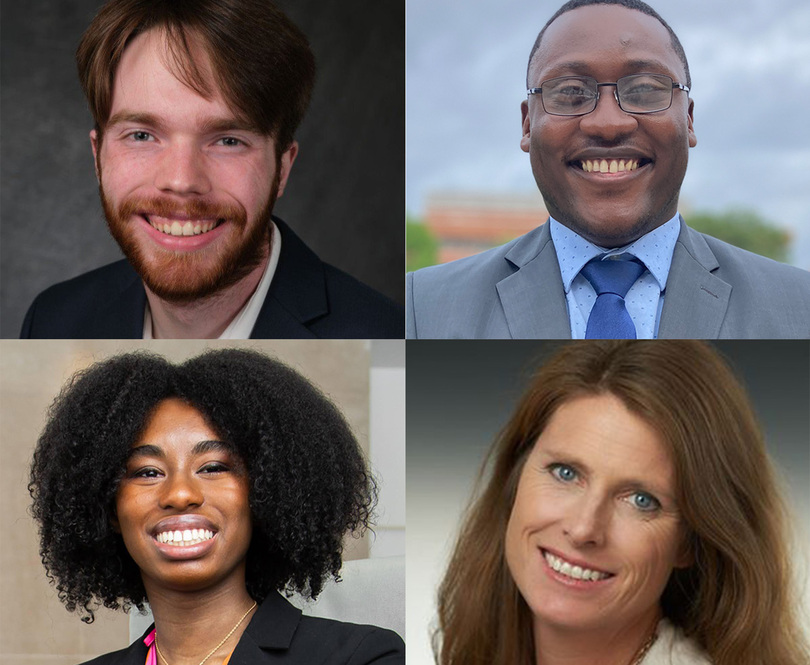SU appoints 7 new members to the Board of Trustees

New members will work with the board and its committees to develop initiatives at SU with their connections to communities they represent. Cassandra Roshu | Photo Editor
Get the latest Syracuse news delivered right to your inbox.
Subscribe to our newsletter here.
Syracuse University added seven new members to its Board of Trustees for the 2023-24 academic year, consisting of three faculty and staff members and four student-appointed representatives.
In their roles as representatives, the new members will work with the board and its committees on developing initiatives at SU based on their connections to the communities they represent.
Michael Speaks is the academic dean representative, Christine Ashby is the faculty representative and Kati Foley is the staff representative. Nathanael Linton is the law student representative and Qingyang Liu is the graduate student representative, while Dylan France and William Treloar are the two undergraduate representatives.
Linton, who serves as the law student representative to the board, was previously on the Academic Affairs subcommittee on the Board of Trustees when he was an undergraduate student at Pace University. In addition to his role on the board, Linton works with SU’s Student Bar Association to bring issues that he sees to be fit to its board. Linton said he relies on support from his peers to give him insight into the needs of students.
“The Board of Trustees is the highest level of a university, and to be able to present issues on behalf of the student body is a great responsibility,” Linton said.
Over the course of this academic year, Linton hopes to successfully capture the voices of law students and bring awareness to what’s happening in their community.
“My background in the College of Law has given me the opportunity to see various aspects of the law student experience, and how that is unique to each and every law student,” Linton said.
France, another one of this year’s new student representatives, said she plans to use her experience as president of the Black Student Union to utilize and best encapsulate student needs on campus. France also serves as SU’s Student Association comptroller.
“I constantly hear different issues that students are having, especially students of color,” France said. “To be able to take those ideas … but also be able to just reach all types of students on campus, I think is a skill that I’ve gained.”

Sierra Zaccagnino | Design Editor
While France acknowledged the board’s work on the deadline for the university’s net-zero sustainability goals last year, she said she wants to focus on initiatives relating to food services, transportation and reporting processes this year.
Ashby, a professor of Inclusive Special Education and Disability Studies and the director of SU’s Center on Disability and Inclusion, was chosen to represent SU faculty. Ashby said she’s also been involved in the Board of the Committee of Academic Affairs and the Board at Executive Committee to highlight the issues that SU faculty care about.
Ashby said that in her role, she hopes that board members will take issues into consideration when making decisions. Prior to board meetings, representatives share reports with the rest of the board, and then present and answer questions during the meetings, she said.
“It really is an opportunity to make visible for the members of the board, what faculty life is, what the work of faculty is, but also what are the key issues that faculty on this campus care about?” Ashby said. “Really bringing that strong focus on the role of faculty and their central role in the academic enterprise, and making that come to life for the board, I think is the most important role.”
One of the topics Ashby hopes to bring forward to the board is how the new Academic Strategic Plan gets operationalized. Ashby said she’s curious about the roles of faculty and the individual schools and colleges, and how their roles will evolve over the next several years.
Another goal that Ashby has as a faculty representative is exploring SU’s commitment to diversity, equity and inclusion, in light of the recent Supreme Court ruling that banned affirmative action. With the majority of her research and work related to inclusion, Ashby said she’s interested in how SU continues to advance DEIA students, faculty and staff with disabilities.
For Treloar, becoming an undergraduate representative was automatic when he was elected as SA President in April. Before becoming President of the SA, Treloar served as Speaker of the Assembly last academic year.
“Being Student Association president is all about listening to student needs and creating action plans,” Treloar said. “It’s about advocating for what students are looking forward to in the administration.”
Treloar said his experience from SA translates to the “next step up” as an undergraduate representative, by continuing to put students’ needs at the forefront of his work.
“We’re here because we want to make sure that student needs are the top priority, and so the University under the Board of Trustees is responsive to what students want,” Treloar said.





